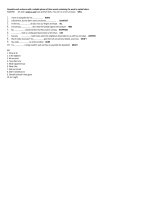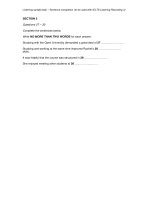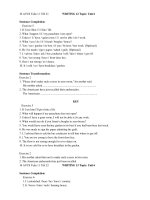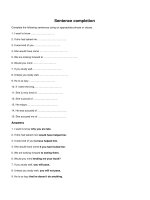Low advanced sentence completion 4
Bạn đang xem bản rút gọn của tài liệu. Xem và tải ngay bản đầy đủ của tài liệu tại đây (545.68 KB, 6 trang )
englishforeveryone.org
Name________________
Date________________
●Sentence Completion 4 (low-advanced SAT level)
Directions: Choose the best word(s) to complete each sentence.
1. Because of the professor’s reputation for
being ______, the students in her class were
surprised by her ______ in the first lecture of
the semester.
A.
B.
C.
D.
E.
garrulous ... bombast
pithy ... terseness
succinct ... congeniality
loquacious ... brevity
erudite ... intellect
2. Nearly every ancient culture had a myth
involving a trickster character, a ______
individual who creates mischief either
through cunningness or foolishness.
A.
B.
C.
D.
E.
waggish
venerable
stoic
portly
stern
3. The hall of fame committee was nearly
unanimous in ______ the star athlete;
only one voter ______ and did not
support the athlete’s induction.
A.
B.
C.
D.
E.
dismissing ... saluted
praising ... duped
lauding ... dissented
reprimanding ... abstained
ruing ... refrained
4. The repair shop attempted to ______ the
damaged automobile but ultimately
decided it was irreparable.
A.
B.
C.
D.
E.
sabotage
sap
salvage
retain
retrench
5. Far more than being merely ______, the
titular character in Herman Melville’s The
Confidence-Man appears to be downright
______; most contemporary scholars
assume he is a fill-in for the devil.
A.
B.
C.
D.
E.
villainous ... evil
restive ... furtive
decorous ... misanthropic
nefarious ... indecent
moral ... virtuous
6. The author’s first novel had such a
______ story that critics quickly dismissed
the author as a ______.
A.
B.
C.
D.
E.
hackneyed ... professional
suspenseful ... poseur
transparent ... scamp
trite ... hack
convoluted ... realist
7. The governor and his entourage traveled
to the best restaurant in Seattle because
they wanted to eat food prepared by the
state’s ______ chef.
A.
B.
C.
D.
E.
abominable
preeminent
potable
monastic
haggard
8. Upon being cited for speeding, the driver
became ______ and took out his anger by
smashing a CD case on his dashboard.
A.
B.
C.
D.
E.
allayed
depraved
hypercritical
guileless
irate
Answers and Explanations
1) D
To figure out what the missing words are, try to predict their definitions by using
key words from the prompt. Here, it is impossible to predict the words
themselves, though it is possible to figure out the relationship between them. In
this prompt, the key word is “surprised,” so whatever the first word is, it must be
the opposite meaning of the second word. After all, if the words had the same
meaning, then the students would not be “surprised.” Of the answer choices, only
(D) offers a pair of opposites; loquacious means talkative, while brevity means
conciseness.
(A) is incorrect because garrulous means talkative and bombast means pompous
speech. Thus, there is no relationship between the words.
(B) is incorrect because pithy means concise and terseness means conciseness.
Thus, the words have similar, not opposite, meanings.
(C) is incorrect because succinct means concise and congeniality means
pleasantness. Thus, there is no relationship between the words.
(E) is incorrect because erudite means learned or scholarly and intellect means
higher mental powers. Thus, the words have similar, not opposite, meanings.
2) A
To figure out what the missing word is, try to predict its definition by using key
words in the prompt. Here, the key words are “trickster” and the phrase “creates
mischief.” Thus, the missing word must be an adjective that would describe a
trickster who creates mischief. (A) is correct as it offers such a word: waggish
means mischievous or tricky.
(B) is incorrect because venerable means deserving high respect, which is not
something that would be said of a trickster.
(C) is incorrect because stoic means impassive, a word that has nothing to do
with a trickster or mischief.
(D) is incorrect because portly means stout, a word that has nothing to do with a
trickster or mischief.
(E) is incorrect because stern means strict, a word that has nothing to do with a
trickster or mischief.
3) C
To figure out what the missing words are, try to predict their definitions by using
key words in the prompt. The key word for the first blank comes in the sentence’s
second clause, when it is revealed that the athlete was inducted into the hall of
fame. Thus, the committee must have praised the athlete, as it would not have
been likely to vote for an athlete whom it did not praise.
The second missing word’s key phrase is in the first clause: “nearly unanimous.”
“Nearly unanimous” implies that a vast majority, but not all, of the members voted
for the athlete’s induction. Thus, one voter must have not supported the
induction, or else it would have been a unanimous decision. The two words are,
thus, opposites, as the first refers to supporting and the second to rejecting the
athlete.
Of the answer choices, only choice (C) provides a word that implies “praising” for
the first missing word and that one voter did not support the induction for the
second missing word. Lauding means praising, while dissented means differed in
opinion.
(A) is incorrect because dismissing means rejecting and saluted means honored.
As the athlete was inducted into the hall of fame, the committee probably did not
reject him. These words have the proper opposite meaning but would have to be
in reverse order to work as an answer choice.
(B) is incorrect because only one of the words fits for a missing word. While
praising works in context for the first missing word, as praising means honoring,
duped means fooled or tricked and, thus, has no connection to anything in the
prompt.
(D) is incorrect because only one of the words fits for a missing word. While
abstained works in the second blank, as abstained means did not participate,
reprimanding means punishing and, as such, means the opposite of the word
that would have to go in the first blank.
(E) is incorrect because only one of the words fits for a missing word. While
refrained works in the second blank, as refrained means did not participate,
ruing means regretting and, as such, means the opposite of the word that would
have to go in the first blank.
4) C
To figure out what the missing word is, try to predict its definition by using key
words in the prompt. Here, the key word is “irreparable,” a word that means the
automobile could not be fixed. However, the prompt implies that the repair shop
attempted to fix the automobile before deciding it could not be fixed. Thus, the
missing word must mean something akin to fix. Of the answer choices, only (C)
provides a word that means fix, as salvage means rescue from loss.
(A) is incorrect because sabotage means deliberately destroy and is, thus, the
opposite of what a repair shop would attempt to do to a damaged automobile.
(B) is incorrect because sap means undermine and is, thus, the opposite of what
a repair shop would attempt to do to a damaged automobile.
(D) is incorrect because retain means keep or employ. A repair shop would not
be likely to keep an irreparable automobile, so it does not work in context.
(E) is incorrect because retrench means economize, a word that in no way
describes what a repair shop would do to a damaged automobile.
5) A
To figure out what the missing words are, try to predict their definitions by using
key words in the prompt. Here, the key word for both words is the “devil” in the
last clause. The devil is descriptive of something negative. The construction of
the prompt is such that the two words both mean bad things, but the first one is
less bad than the second one, as the second missing word is “more than” the first
one. (A) is the best choice as it provides two words that would describe the devil,
though the second one is worse in degree than is the first. Villainous means
wicked, while evil means profoundly wicked.
(B) is incorrect because restive and furtive do not have a relationship of degree.
Restive means impatient, while furtive means sneaky. Neither necessarily would
be descriptive of the devil, either.
(C) is incorrect because decorous and misanthropic do not have a relationship of
degree. Decorous means proper, while misanthropic means people hating. Of
these, only the latter would describe the devil.
(D) is incorrect because nefarious and indecent are the right words in the wrong
order. The prompt requires the more severe word to go in place of the second
missing word, but nefarious is the more extreme, as it means very wicked, while
indecent means merely improper.
(E) is incorrect because moral and virtuous are not words that would describe the
devil, as moral means proper and virtuous means extremely moral.
6) D
To figure out what the missing words are, try to predict their definitions by using
key words in the prompt. Here, it is impossible to predict the meanings of the
words, though one can predict their relationship. The construction of the
sentence suggests that the first missing word caused critics to “dismiss the
author” as whatever the second missing word is. Thus, the first missing word
must be an adjective that could be used to describe the noun of the second
missing word. Of the answer choices, only (D) provides such a relationship: trite
means hackneyed, and hack can refer to a mediocre writer.
(A) is incorrect, because hackneyed means commonplace and professional
means an expert. Thus, there is no relationship between these two words.
(B) is incorrect because suspenseful means exciting and poseur means
someone who pretends to be sophisticated but is not. There is no relationship
between these words.
(C) is incorrect because transparent means clear and scamp means a rascal.
These words have no relationship.
(E) is incorrect because convoluted means intricate and realist means a person
who represents things as they really are. If anything, these words have opposite
meanings, not similar meanings.
7) B
To figure out what the missing word is, try to predict its definition by using key
words from the prompt. Here, the key word is “best.” The governor wanted to eat
at the best restaurant so he/she could eat food prepared by the “best” chef. (B) is
the best choice, then, as preeminent means outstanding.
(A) is incorrect because abominable means extremely unpleasant, the opposite
of the word the prompt is looking for.
(C) is incorrect because potable means suitable for drinking. Thus, this word has
no relationship to the rest of the prompt.
(D) is incorrect because monastic means related to monks. Thus, this word has
no relationship to the rest of the prompt.
(E) is incorrect because haggard means gaunt or wasted away. It has nothing to
do with the “best restaurant in Seattle,” then.
8) E
To figure out what the missing word is, try to predict its definition by using key
words in the prompt. Here, the key word is “anger,” as the driver took out his
anger after becoming the missing word. Thus, the missing word must mean
something akin to “angry.” Of the answer choices, (E) is the best, as irate means
angry.
(A) is incorrect because allayed means soothed, a word that is the opposite of
anger. If the driver were allayed, he would not need to take out his anger.
(B) is incorrect because depraved means wicked, and the prompt only suggests
that the driver became angry, not that he became evil or wicked.
(C) is incorrect because hypercritical means exacting, a word that does not relate
to the fact that the driver took out his anger.
(D) is incorrect because guileless means honest. Nothing in the prompt suggests
that the driver was honest, only that he took out his anger.









